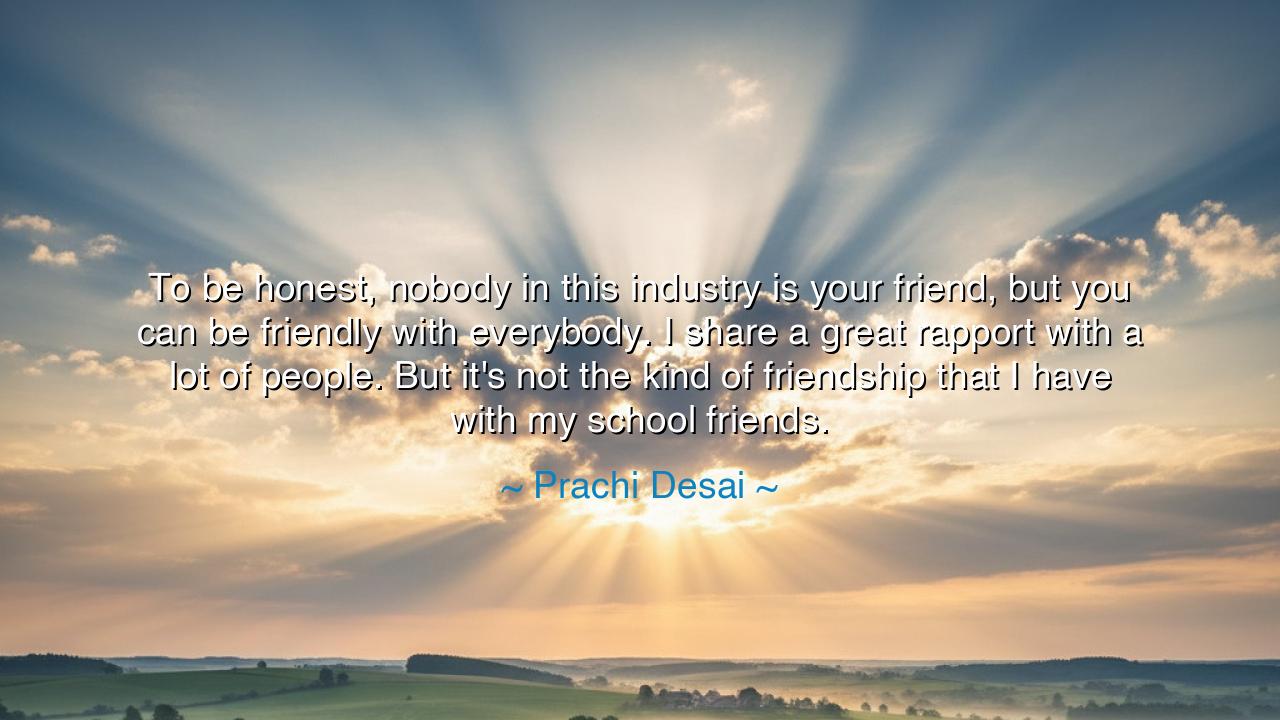
To be honest, nobody in this industry is your friend, but you can
To be honest, nobody in this industry is your friend, but you can be friendly with everybody. I share a great rapport with a lot of people. But it's not the kind of friendship that I have with my school friends.






In the eternal dance of human connection, there is a profound truth that has echoed through the ages: not all relationships, no matter how cordial, are bound by the sacred trust of true friendship. The words of Prachi Desai resonate deeply in this understanding: "To be honest, nobody in this industry is your friend, but you can be friendly with everybody. I share a great rapport with a lot of people. But it's not the kind of friendship that I have with my school friends." These words, though simple, carry with them a great wisdom—a wisdom that speaks to the nature of relationships in a world driven by ambition, competition, and the fleeting desires of the self. True friendship, as Desai so plainly notes, cannot be manufactured or expected in environments where interests often change like the shifting sands.
This notion finds its roots in the ancient wisdom of the Greeks, who spoke of different kinds of relationships, each with varying levels of depth and trust. The philosopher Aristotle famously delineated between friendships of pleasure, utility, and virtue in his work, Nicomachean Ethics. The highest form of friendship, he argued, is one rooted in virtue, where friends share a deep, unwavering connection grounded in mutual respect and a shared pursuit of goodness. However, friendships of utility—those that are formed for practical or material reasons—are more common, especially in environments such as business or the entertainment industry. These relationships are temporary, often fragile, and serve specific purposes. They are cordial, but not the enduring bonds of true friendship.
In the ancient world, the Romans too understood the complexity of human relationships. The philosopher Cicero believed that true friendship was something rare and precious, something that could not easily be found among the masses. In his treatise on friendship, De Amicitia, Cicero emphasized that friendship is forged not by convenience or necessity, but by shared values and the pursuit of the good life. In this light, Desai’s words reflect the reality of many modern relationships: rapport can be built, kindness can be shared, but not all connections bear the weight of true friendship. In a world full of shifting alliances and external expectations, the friendships formed for practical purposes cannot compare to the depth of those that transcend self-interest.
Consider the example of Alexander the Great, who, despite his conquests and the many alliances he made during his campaigns, shared a true and rare friendship with Hephaestion, his companion from youth. Their bond, forged in the crucible of shared experiences and deep trust, was of a different order than the many strategic alliances Alexander formed with rulers and generals. Hephaestion was not merely a comrade in arms; he was a true friend, one who shared in Alexander's personal and emotional life. This distinction between a useful relationship and a genuine friendship is what Desai alludes to in her statement. Friendships of virtue require time, vulnerability, and mutual care—qualities that are not easily found in competitive or transactional environments.
Yet, even within these environments, rapport—the ability to connect with others on a friendly and professional level—is still of great value. Desai’s experience reflects a truth that can be found in every corner of human society: to thrive in the world, one must know how to build connections. This ability to be friendly, to establish relationships that are built on mutual respect, trust, and kindness, is essential in any career or social structure. However, it is important to recognize that these connections should not be confused with the sacred bond of true friendship, which is a rarer, deeper connection—one that exists outside of need or advantage.
The lesson from Desai’s words is both simple and profound. It is a call to honor the friendships that are most meaningful in your life—those that are built on a foundation of shared history, values, and genuine care. At the same time, it is a reminder that rapport—the ability to be friendly and cordial—is an invaluable skill in navigating the world, especially in environments where alliances are often fluid and based on opportunity rather than virtue. But never mistake the fleeting warmth of friendly rapport for the eternal bond of true friendship, for the latter is a treasure that must be tended with the deepest care and unwavering commitment.
So, let us heed the wisdom of Desai and the ancients alike. Nurture those friendships that bring depth and meaning to your life, the ones that are based on trust, honesty, and a shared pursuit of the good. In the same breath, embrace the friendly connections that make the world a more pleasant place, but know that they exist within a different realm—one that, while valuable, cannot replace the true and eternal bonds of friendship. In doing so, you will find the balance between connection and true companionship, and in this, you will cultivate a life rich in both meaningful friendships and lasting rapport.






AAdministratorAdministrator
Welcome, honored guests. Please leave a comment, we will respond soon